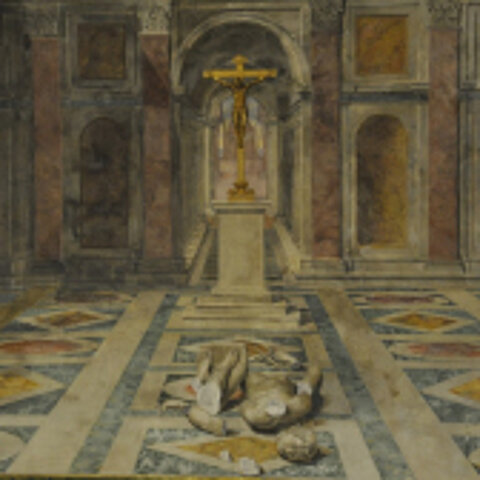Venue :
· Casa de Velázquez - C/ de Paul Guinard, 3 - 28040 Madrid (Spain)
· Biblioteca Nacional de España - Paseo de Recoletos, 20-22, 28001 Madrid


Venue :
· Casa de Velázquez - C/ de Paul Guinard, 3 - 28040 Madrid (Spain)
· Biblioteca Nacional de España - Paseo de Recoletos, 20-22, 28001 Madrid
The year 2017 marks the Fifth Centenary of a fundamental event in the history of Europe—five hundred years ago, on 31 October, an Augustinian monk called Martin Luther sent a letter to various political and religious authorities in which he questioned some basic principles of the spiritual Economy of the Catholic Church. The principal target of those 95 theses was the practice of Indulgences; the Reform would soon turn its critical eye on the whole gamut of practices in which the Church of Rome wrapped the foundations of faith (sola fide) and Scripture (sola Scriptura): a set of ritual and sacramental practices that came between God and men, which the Reformers early on described as idolatrous. Although Luther's position eventually turned out to be moderate, there was no shortage of more radical preachers who turned images into one of the key issues of the Reform movement, re-igniting fires which had abated in various parts of Europe in the century before (e.g. Lollards and Hussites) but which in the course of the 16th century engulfed much of continental Europe in a series of violent iconoclastic convulsions.
The new century commenced with a tremendous debate on the value and meaning of images in religious practice, a Great Debate which, far from tracing a clear division between two opposing worlds—Catholic and Protestant—gave rise to a long-lasting controversy without which it is impossible to understand the emergence of what we call Art in the Early Modern Age. This debate was pursued on at least three different fronts:
Spain did not stand aloof from this debate, nor was its position immutable and monolithic as it is sometime portrayed. Firstly, because the battle had to be waged in part within its own frontiers—as demonstrated by the records of the Inquisition. Secondly, because various movements developed within Spain which were contrary to the use of images (the alumbrados for instance), and even took root across the Mediterranean (Valdesianismo in Italy). Thirdly and lastly, because Spain was part of a geography that was much larger, more fluid and more complex than the Iberian Peninsula, namely the Catholic Monarchy, including the territories and possessions in Italy, in Northern Europe and Latin America.
The aim of this course is to address these three fundamental aspects:
1) the historical debate and its relationship with the history of the Reform.
2) The geography of the problem.
3) The new discourse of a reformed Art, Protestant and Catholic alike.
James Amelang, Universidad Autónoma de Madrid
Fabrizio Biferali, Università Sapienza di Roma
Agustín Bustamante, Universidad Autónoma de Madrid
Olivier Christin, Université de Neuchâtel
María Cruz de Carlos, Universidad Autónoma de Madrid
Tom Cummins, Harvard University
Mercedes García Arenal, CSIC, Madrid
Serge Gruzinski, Ecole des hautes études en sciences sociales, Paris
Carlos Eire, Yale University
Massimo Firpo, Scuola Normale, Pisa
Fernando Marías, Universidad Autónoma de Madrid
Peter Parshall, National Gallery of Art, Washington, D.C
Felipe Pereda, Harvard University
Werner Thomas, Leuven University
Openings: limited, maximum 20
Sessions are divided between theoretical lectures (2-3 per day) and practical seminars (one daily). Lectures will be held in the conference room of the Casa de Velázquez. The practical seminars focus on the study of works of art and sources facilitating their study. These seminars will be held at the various institutions collaborating with the programme:
Reading material will be distributed prior to the lectures and seminars to help participants deepen their knowledge of the research topics and to spark discussion in the seminars.
Working languages are English and Spanish, in equal proportions.
The registration deadline is 20th February 2017. The online registration form is available at the Casa de Velázquez website.
The 20 workshop participants will be selected based on their academic record, training background and language skills. Priority will be given to candidates who are working on a doctoral thesis or a Master’s degree in fields related to the topics addressed in the workshop. Therefore, applicants must submit a short text (maximum 500 words) summarising their reasons for applying for the course.
After 25th february 2017, selected candidates will be informed regarding how to make payment and enrol. A certificate of attendance will be awarded at the end of the course.
The price of the workshop is 300 Euros (with accommodation) or 150 Euros (without accommodation), and includes:
Travel expenses and the other 3 dinners are not included.
Financial aid may be awarded based on candidates' academicrecord and country of origin.
| S | M | T | W | T | F | S |